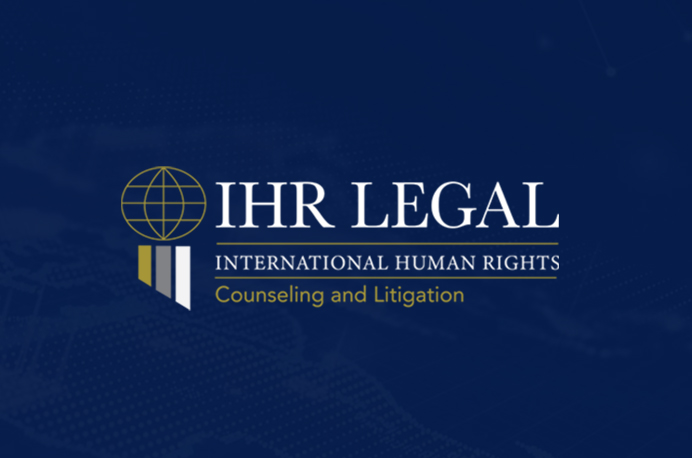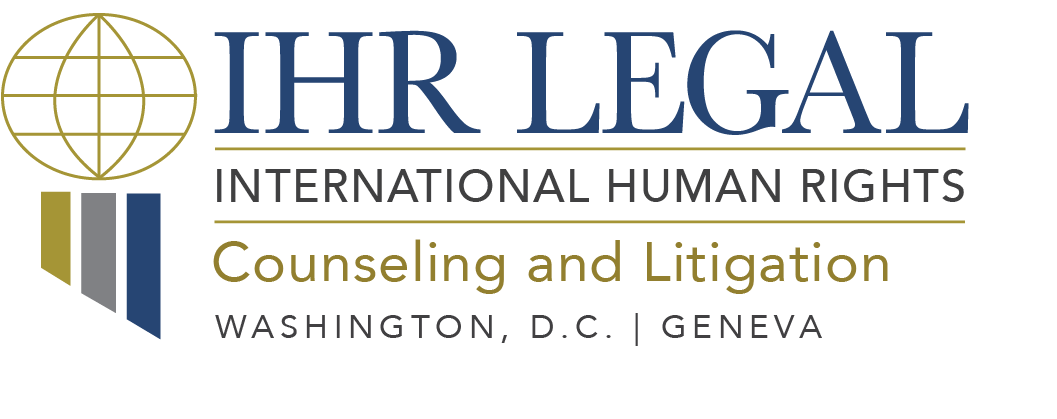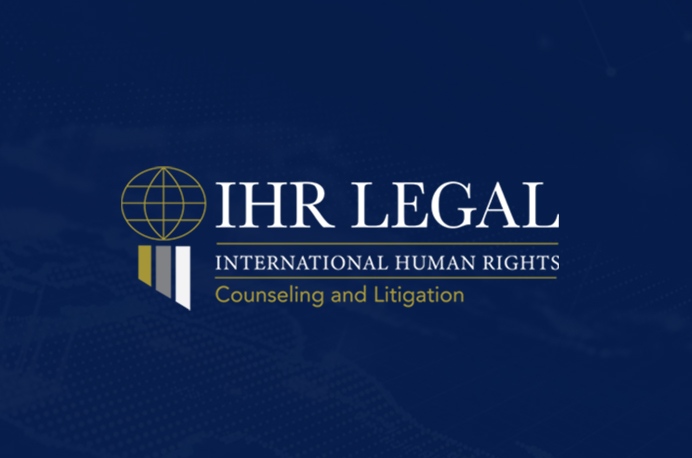
IHR LEGAL Newsletter
IHR LEGAL Newsletter
July – September 2021

In this Issue:
New developments concerning the universal and regional systems for the promotion and protection of human rights.
Access Previous Issues:
New developments concerning the universal and regional systems for the promotion and protection of human rights
I. THE UNIVERSAL HUMAN RIGHTS SYSTEM
1. Office of the United Nations High Commissioner for Human Rights (OHCHR)
The OHCHR is the principal human rights entity of the United Nations. Its functions include promoting and protecting all human rights, helping to empower people, and developing a human rights perspective in all United Nations programs. The current United Nations High Commissioner for Human Rights is Mrs. Michelle Bachelet.
Latest News and Updates from the OHCHR:
– On August 24, 2021, High Commissioner Michelle Bachelet urged the Taliban to respect the rights of women and girls in Afghanistan. During a special session of the Human Rights Council, and after receiving several reports of serious human rights violations, High Commissioner Bachelet called on the Taliban to adopt responsible and human rights-respectful standards of governance, as well as to work to restore social cohesion and reconciliation. Among her considerations, the High Commissioner stressed that girls should be guaranteed access to quality secondary education and that women should have meaningful participation in government. The news can be found here.
2. Human Rights Committee (HRC)
The HRC is the United Nations body of independent experts that monitors its States Parties’ implementation of the International Covenant on Civil and Political Rights.
Latest News and Updates from the HRC:
– On July 21, 2021, the HRC issued its decision in the Case “Alberto Velásquez Echeverri v. Colombia”. According to the facts of the case, the author of the communication, between August 7, 2002, and July 19, 2004, held the position of director of the Administrative Department of the Presidency of the Republic of Colombia, during the government of the then President Álvaro Uribe. Between June 2 and June 4, 2004, the Congress of the Republic approved Legislative Act No. 267, which made possible the presidential reelection of the then-president. Subsequently, it became known in the media that some congressmen had accepted promises of remuneration in exchange for voting in favor of the bill. As a result, on May 14, 2008, the Attorney General’s Office opened an ex officio disciplinary investigation against the author of the communication, in which he was acquitted. However, on March 6, 2012, the Sixth Delegated Prosecutor re-qualified the case and issued an indictment against the author as allegedly responsible for the crime of bribery. Thus, on April 15, 2016, the Supreme Court of Justice convicted Mr. Velásquez as a co-perpetrator of the crime of bribery, without the possibility of appealing the ruling. There were several irregularities in the criminal proceedings and, given this, the HRC determined that there were violations of the rights to appeal the decision, equality before the law, personal liberty, presumption of innocence, personal safety, and the right to be tried by a competent, independent and impartial court. The decision can be found here.
– On August 23, 2021, the HRC issued its decision in the Case “Aleh Aheyeu v. Belarus”, after examining the complaint filed by Aleh Aheyeu, a defense lawyer representing Ales Mikhalevich, an opposition candidate in the 2010 presidential elections.
The facts of the case concern the detention of Mr. Mikhalevich the day after the presidential elections by agents of the Belarusian KGB , on charges of organising mass riots”. Mikhalevich denied the accusations, stating that the protests were aimed at highlighting the results of an unfair election that gave victory to President Alexander Lukashenko, in office since 1994. During his detention, Mikhalevich was allegedly tortured and deprived of medical care and legal assistance.
In this context, Aheyeu denounced Mikhalevich’s detention conditions in the media. Upon this, the Belarusian authorities initiated an investigation against Aheyeu for allegedly exceeding his duties as a lawyer and violating professional ethics. On February 14, 2011, following a proceeding in Aheyeu’s absence, the Ministry of Justice canceled his professional license, arguing that he had “committed an offense incompatible with the practice of law”. After making several unsuccessful appeals to the authorities to reverse the decision, Aheyeu turned to the HRC, which found that his rights to a fair trial and freedom of expression were violated. The decision can be found here.
3. Committee on the Elimination of Discrimination against Women (CEDAW)
The CEDAW is the body of independent experts that monitors the implementation of the Convention on the Elimination of All Forms of Discrimination against Women by its States Parties.
Latest News and Updates from the CEDAW:
– On July 1, 2021, the CEDAW urged Turkey to reconsider its withdrawal from the Istanbul Convention. The Istanbul Convention, officially known as the Council of Europe Convention on Preventing and Combating Violence against Women and Domestic Violence, is a regional human rights instrument aimed at protecting women against all forms of violence and holding perpetrators accountable. The CEDAW expressed grave concern regarding the risk that the protection of women and girls against violence in Turkey will be further undermined as a result of the country’s withdrawal from the Convention. The CEDAW, therefore, urged Turkey to reconsider its decision as a matter of highest priority and by all possible means. At the same time, it invited Turkey to strengthen its dialogue and cooperation with the Committee. More information can be found here.
II. AFRICAN HUMAN RIGHTS SYSTEM
1. African Commission on Human and People’s Rights (ACHPR)
The ACHPR is a quasi-jurisdictional body within the framework of the African Union whose main function is to protect and promote human and peoples´ rights in African countries. Among its responsibilities is to process complaints from individuals or States about human rights violations committed by States in the region and to receive periodic reports from States on the human rights situation in their country.
Latest News and Updates from the ACHPR:
– On the occasion of the International Day of the Victims of Enforced Disappearances commemorated every August 30, the African Commission on Human and Peoples’ Rights Working Group on the death penalty, extrajudicial, summary, or arbitrary executions and enforced disappearances in Africa issued a press release, stating that of the 54 States Parties to the African Charter on Human and Peoples’ Rights, only 17 have ratified the International Convention for the Protection of All Persons from Enforced Disappearance. It, therefore, encouraged States that have not yet ratified the Convention to do so, to effectively prevent and protect their populations from enforced disappearances.
In addition, the Working Group noted that enforced disappearances involve the violation of numerous human rights, not only of the disappeared persons but also of their families and communities. The press release in French can be found here.
– On August 23, 2021, the ACHPR issued a press release on the murder of journalist Joël Musavuli and the safety of journalists in the Democratic Republic of Congo. According to the facts of the case, the journalist, who had already been living in hiding with eight other journalists since November 2019 due to threats from armed groups, was shot dead by unidentified men. His wife was also seriously wounded with a machete and later died. According to several credible sources, this deadly attack followed threats against journalist Joël Musavuli because of his program “Rahiya Tufungule Macho” (Let’s open our eyes, people) on June 26, which analyzed the evolution of the state of siege and the harmful effects of armed groups.
Jamesina Essie L. King, Special Rapporteur on freedom of expression and access to information of the ACHPR, and Marie Louise Abomo, Chairperson of the Working Group on specific issues related to the work of the ACHPR, also noted that the late Joël Musavuli is not the first journalist to suffer this fate in the region. They, therefore, called on the government of the Democratic Republic of Congo to take urgent measures to ensure the safety and physical integrity of journalists and their families, especially those most at risk according to available data. The press release can be found here.
2. African Court on Human and People’s Rights (ACtHPR)
The ACtHPR, which is also an institution of the African Union, resolves contentious cases of human rights violations, orders provisional measures, and presents its expert opinions on human rights issues.
Latest News and Updates from the ACtHPR:
– Between September 6 and October 1, 2021, the ACtHPR held its 62nd regular session at its headquarters in Arusha, United Republic of Tanzania. The judges considered several applications during the four-week session. The press release can be found here.
Moreover, on September 30 the ACtHPR delivered 10 judgments: 9 against Tanzania and one against Benin. The official summary of the judgments can be found here.
III. EUROPEAN HUMAN RIGHTS SYSTEM
1. European Court of Human Rights (ECtHR)
The European Court of Human Rights (ECtHR) is a judicial body of the Council of Europe whose main function is to monitor the compliance of States parties with the European Convention for the Protection of Human Rights and Fundamental Freedoms. The ECtHR is responsible for analyzing complaints from individuals, groups of individuals, or States for human rights violations committed by States that have accepted its jurisdiction.
Latest News and Updates from ECtHR:
– The ECtHR issued, on September 16, 2021, a judgment in the Case “X v. Poland”. The case concerned a proceeding that the applicant initiated to challenge the withdrawal of custody of her minor child after her ex-husband obtained a change in the custody regime ordered in the divorce judgment. She alleged that the courts had acted in his favor because of her relationship with another woman. Relying on Article 14 (Prohibition on discrimination) in conjunction with Article 8 (Right to respect for private and family life) of the European Convention on Human Rights, the applicant complained that the domestic courts had refused to grant her custody of her child on the grounds of her sexual orientation. The Court found that the applicant’s sexual orientation and her relationship with another woman had always been at the center of the deliberations and present at all stages of the court proceedings. The ECtHR therefore concluded that there had been a difference in treatment between the applicant and the other parent and that this difference had been based on the applicant’s sexual orientation and thus constituted discrimination. The judgment can be found here.
IV. INTER-AMERICAN HUMAN RIGHTS SYSTEM
1. Inter-American Commission on Human Rights (IACHR)
The IACHR is the autonomous body of the Organization of American States (OAS) responsible for the promotion and protection of human rights in the Americas. One of its duties is to receive and review complaints from individuals for human rights violations and to monitor human rights situations.
Latest News and Updates from the IACHR:
– On September 17, 2021, the IACHR expressed its concern about the expulsions of persons in the context of human mobility from the United States and Mexico, and urged the States involved to ensure the effective protection of their rights. The IACHR expressed its concern over the implementation of accelerated expulsion procedures from the United States to Mexico’s borders. In turn, Mexico is reportedly expelling persons in an irregular migratory situation, including those who were expelled from the United States to different borders with Guatemala. In addition, the IACHR stated that when people are expelled or returned to their countries of origin or habitual residence, without an adequate determination of their possible need for international protection, they would again face situations similar to those that forced them to leave their country of origin. On certain occasions, returnees would not have access to sufficient protection to ensure their safety and reintegration into their communities of origin. The press release can be found here.
– The IACHR expressed its concern over regressive measures on sexual and reproductive rights in the region. On August 11, 2021, the IACHR published a press release in which it criticized measures that restrict voluntary termination of pregnancy in an absolute manner –even in cases of rape or incest, danger to the life of the woman or pregnant person, and obstetric emergencies–- and those that limit comprehensive sexual education and education with a gender perspective.
The IACHR considers that these regressive measures are alarming because of the increase in sexual violence against women, girls and adolescents during the pandemic, which, added to other factors, could result in an increase in unwanted pregnancies (especially among girls and adolescents). At the same time, it expressed that the absolute criminalization of voluntary termination of pregnancy violates numerous human rights of women, girls, adolescents and pregnant people and creates a context that facilitates unsafe abortions and high mortality rates. Therefore, the IACHR called on States to adopt measures to guarantee the sexual and reproductive rights of women, girls, adolescents and persons with gestational capacity in accordance with Inter-American human rights standards. The press release can be found here.
– On July 20, 2021, the IACHR published the “Compendium on Truth, Memory, Justice, and Reparation in Transitional Contexts”. The compendium is a systematization of the standards developed during the monitoring and decisions of cases by the Inter-American Commission on the rights to truth, justice, and reparation for serious human rights violations in contexts of transition from dictatorships to democracy or in processes of the search for and consolidation of peace. The document also addresses memory and guarantees of non-repetition as fundamental pillars for strengthening the rule of law and a culture of human rights in the region. The compendium can be found here.
2. Inter-American Court of Human Rights (IACtHR)
The IACtHR is a regional human rights court responsible for applying and interpreting the American Convention on Human Rights and other human rights instruments in the region. Its main function is to decide cases on human rights violations committed by States that have accepted its jurisdiction.
Latest News and Updates from the IACtHR:
– The IACtHR held its 143rd Regular Session between August 17 and September 10, 2021. The IACtHR issued judgments in the following contentious cases: a) Ríos Avalos et al. v. Paraguay; b) Villarroel Merino et al. v. Ecuador; c) Bedoya Lima et al. v. Colombia; d) Lemoth Morris et al. (Buzos Miskitos) v. Honduras; e) Garzón Guzmán v. Ecuador; f) Barbosa de Souza et al. v. Brazil, and g) Casa Nina v. Peru (interpretation of judgment).
In addition, the IACtHR held, remotely, two hearings on provisional and emergency measures, and two hearings on monitoring compliance with judgement. Seven decisions to monitor compliance with judgement and two decisions on provisional measures were approved. The press release regarding the details of the judgments issued and the hearings held is available here.
Access Previous Issues:

IHR LEGAL Newsletter – April to June 2021
Joint Statement on the eve of the International Day against Homophobia, Lesbophobia, Biphobia and Transphobia; Statement by UN High Commissioner for Human Rights, Michelle Bachelet, on the increase of human rights violations and abuses in Mali; Statement by the African Commission on Human and Peoples’ Rights on the occasion of the International Day in Support of Victims of Torture; and much more here.

IHR LEGAL Newsletter – January to April 2021
Statement on the George Floyd case by UN High Commissioner for Human Rights, Michelle Bachelet; IACHR Resolution on “COVID-19 vaccines in the framework of Inter-American Human Rights obligations”; African Commission on Human and Peoples’ Rights Resolution on the excessive use of force by agents of African States; and much more here.



